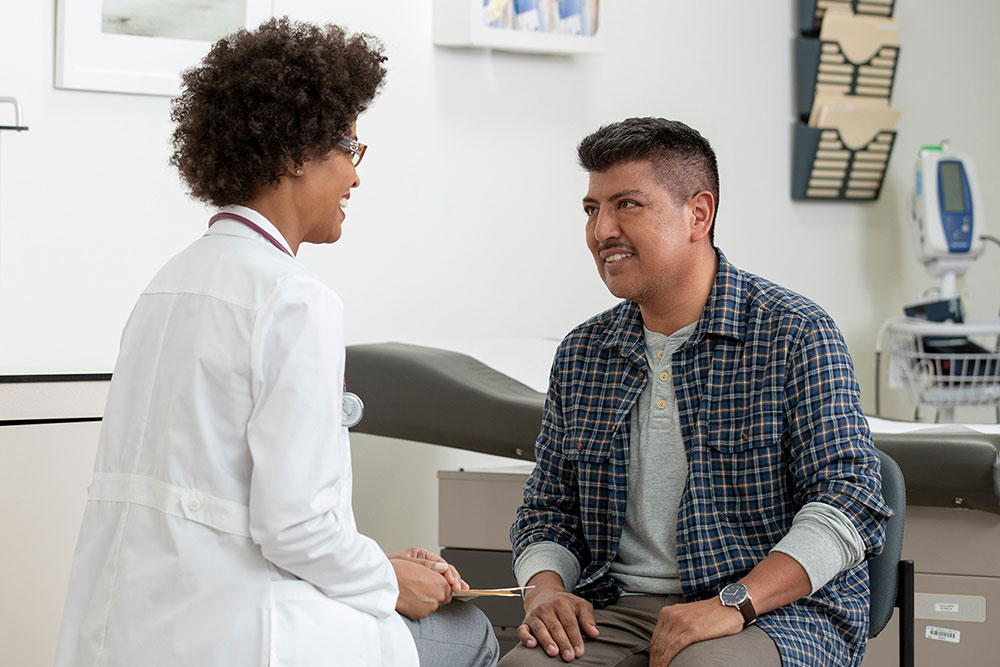

Health Equity and Cancer

How much money one makes, the color of their skin, their sexual orientation, their gender identity, their disability status, or where they live should not affect someone’s ability to live cancer-free or achieve their highest health potential. Cancer is a disease that can affect anyone, but it doesn’t affect everyone equally. Many barriers can impact a person’s ability to prevent, find, treat, and survive cancer. These barriers are because of deeply rooted, long-standing inequities at all levels of society that will take an intentional effort to address in order to have equal cancer outcomes. They are complex and have many social, economic, and cultural influences that intertwine and impact each other. We know that:
- Black people have the highest death rate and shortest survival of any racial/ethnic group for most cancers.
- Breast cancer is the leading cause of cancer death among Hispanic/Latina women in the U.S., and Hispanic/Latina women are also much less likely to be diagnosed at an early stage than non-Hispanic white women.
- Cancer is the leading cause of death in the Asian, Asian American, Native Hawaiian, and Pacific Islander populations.
While these statistics are disturbing, we raise them up as a call to action. That’s why the American Cancer Society has invested $62 million in research grants to better understand what cancer disparities exist, what causes them, and how we can address them. We advocate for policies that ensure people of color with cancer are enrolled in clinical trials, helping ensure that medicines and treatments are safe and effective for people of all racial and ethnic backgrounds. And we fund internships for promising students of color, including $16 million in grants to Historically Black Colleges & Universities to increase the number of underrepresented minorities trained as cancer researchers.
The Collaboration for Equitable Health allows us to extend the work we have been doing. Through this partnership, the American Cancer Society focuses on addressing health equity gaps related to breast, colorectal, and prostate cancer. Efforts include: increasing access to colorectal cancer screening; providing education on early detection and prevention as a commitment to addressing the unequal burden of cancer in Black, Hispanic/Latino, and Asian communities; and working with community members in grassroots and advocacy activities to create policies that can grow and sustain change needed to address inequities at the local and national level.
A cancer diagnosis doesn’t need to be faced alone. Talk or chat live with a trained cancer information specialist at 1-800-227-2345 or get answers and find resources in your community at www.cancer.org.
Breast Cancer Resources
Breast cancer is the most common cancer diagnosed among women in the United States and is the second-leading cause of death from cancer among women. Black women are 41% more likely to die from breast cancer than white women, despite similar incidence rates.
- Breast Cancer Information and Overview (ACS website)
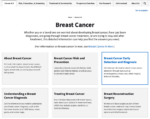 Whether you or a loved one are worried about developing breast cancer, have just been diagnosed, are going through breast cancer treatment, or are trying to stay well after treatment, this detailed information can help you find the answers you need.
Whether you or a loved one are worried about developing breast cancer, have just been diagnosed, are going through breast cancer treatment, or are trying to stay well after treatment, this detailed information can help you find the answers you need. - Breast Cancer Early Detection and Diagnosis (ACS website)
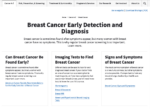 Breast cancer is sometimes found after symptoms appear, but many women with breast cancer have no symptoms. This is why regular breast cancer screening is so important.
Breast cancer is sometimes found after symptoms appear, but many women with breast cancer have no symptoms. This is why regular breast cancer screening is so important. - Questions to Ask Your Doctor About Breast Cancer (ACS website)
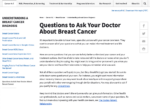 If you’ve been diagnosed with breast cancer, you can take an active role in your care by asking questions about your cancer and its treatment.
If you’ve been diagnosed with breast cancer, you can take an active role in your care by asking questions about your cancer and its treatment.
Colorectal Cancer Resources
Excluding skin cancers, colorectal cancer is the third most common cancer diagnosed in the United States. Colorectal cancer death rates are 35% higher for Black people compared to white people.
- Colorectal Cancer Information and Overview (ACS website)
 Whether you or a loved one are worried about getting colorectal cancer, have just been diagnosed, are going through colorectal cancer treatment, or are trying to stay well after treatment, this detailed information can help you find the answers you need.
Whether you or a loved one are worried about getting colorectal cancer, have just been diagnosed, are going through colorectal cancer treatment, or are trying to stay well after treatment, this detailed information can help you find the answers you need. - Screening Tests for Colorectal Cancer (ACS website)
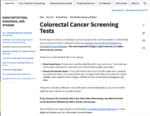 Screening is the process of looking for cancer in people who have no symptoms. Several tests can be used to screen for colorectal cancer. The most important thing is to get screened, no matter which test you choose.
Screening is the process of looking for cancer in people who have no symptoms. Several tests can be used to screen for colorectal cancer. The most important thing is to get screened, no matter which test you choose. - Colorectal Cancer Questions to Ask Your Doctor (ACS website)
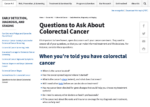 If you’ve been diagnosed, here’s a list of questions about colorectal cancer to ask your doctor to help you better understand your cancer diagnosis and treatment options.
If you’ve been diagnosed, here’s a list of questions about colorectal cancer to ask your doctor to help you better understand your cancer diagnosis and treatment options.
Prostate Cancer Resources
Prostate cancer is the most common cancer among men (after skin cancer), but it can often be treated successfully. Prostate cancer death rates among Black men are more than double that of men in every other major racial/ethnic group.
- Prostate Cancer Information and Overview (ACS website)
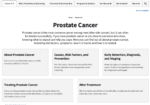 If you have prostate cancer or are close to someone who does, knowing what to expect can help you cope. Here you can find out all about prostate cancer, including risk factors, symptoms, how it is found, and how it is treated.
If you have prostate cancer or are close to someone who does, knowing what to expect can help you cope. Here you can find out all about prostate cancer, including risk factors, symptoms, how it is found, and how it is treated. - Screening Tests for Prostate Cancer (ACS website)
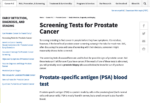 Prostate cancer can often be found early by testing for prostate-specific antigen (PSA) levels in a man’s blood. Another way to find prostate cancer is the digital rectal exam (DRE). If you’re thinking about getting tested for prostate cancer, talk to a doctor about the possible benefits, risks, and limits of prostate cancer screening.
Prostate cancer can often be found early by testing for prostate-specific antigen (PSA) levels in a man’s blood. Another way to find prostate cancer is the digital rectal exam (DRE). If you’re thinking about getting tested for prostate cancer, talk to a doctor about the possible benefits, risks, and limits of prostate cancer screening. - Treating Prostate Cancer (ACS website)
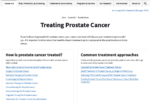 If you’ve been diagnosed with prostate cancer, your cancer care team will discuss your treatment options with you. It’s important to think about the benefits of each treatment option compared to the possible risks and side effects.
If you’ve been diagnosed with prostate cancer, your cancer care team will discuss your treatment options with you. It’s important to think about the benefits of each treatment option compared to the possible risks and side effects.
Caregiver Resources
- Caregiver Resource Guide (PDF)
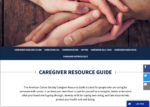 The American Cancer Society Caregiver Resource Guide is a helpful tool for people who are caring for someone with cancer.
The American Cancer Society Caregiver Resource Guide is a helpful tool for people who are caring for someone with cancer. - Caregiver Support Video Series (Videos)
 Caregivers are a crucial part of any cancer care team. The goal of this video series is to provide educational support to caregivers as they assist with the everyday needs of people with cancer and provide self-care techniques to improve their quality of life.
Caregivers are a crucial part of any cancer care team. The goal of this video series is to provide educational support to caregivers as they assist with the everyday needs of people with cancer and provide self-care techniques to improve their quality of life.

It’s a moral imperative that we work together with communities to address these health needs and improve public policy to ensure no one is disadvantaged based on who they are or where they live.
Tawana Thomas-Johnson,
senior vice president and chief diversity officer at the American Cancer Society